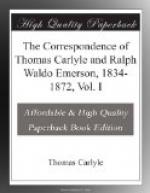This Sum is part of a payment from Little and Brown on account of sales of your London French Revolution and of Chartism. As another part of their payment they asked me if they might not draw on the estate of James Fraser for a balance due from his house to them, and pay you so. I, perhaps unwisely, consented to make the proffer to you, with the distinct stipulation, however, that if it should not prove perfectly agreeable to you, and exactly as available as another form of money, you should instantly return it to me, and they shall pay me the amount, $41.57, or L8 12s. 5d. in cash. My mercantile friend, Abel Adams, did not admire my wisdom in accepting this bill of Little and Brown; so I told them I should probably bring it back to them, and if there is a shadow of inconvenience in it you will send it back to me by the next steamer. For they have no claims on us. I decide not to enclose the Little and Brown bill in this sheet,—but to let it accompany this letter in the same packet.
I grieve to hear that you have bought any of our wretched Southern Stocks. In New England all Southern and Southwestern debt is usually regarded as hopeless, unless the debtor is personally known. Massachusetts stock is in the best credit of any public stock. Ward told me that it would be safest for you to keep your Illinois stock, although he could say nothing very good of it.
Our city banks in Boston are in better credit than the banks in any other city here, yet one in which a large part of my own property is invested has failed, for the two last half-years, to pay any dividend, and I am a poor man until next April, when, I hope, it will not fail me again. If you wish to invest money here, my friend Abel Adams, who is the principal partner in one of our best houses, Barnard, Adams, & Co., will know how to give you the best assistance and action the case admits.
My dear friend, you should have had this letter and these messages by the last steamer; but when it sailed, my son, a perfect little boy of five years and three months, had ended his earthly life.* You can never sympathize with me; you can never know how much of me such a young child can take away. A few weeks ago I accounted myself a very rich man, and now the poorest of all. What would it avail to tell you anecdotes of a sweet and wonderful boy, such as we solace and sadden ourselves with at home every morning and evening? From a perfect health and as happy a life and as happy influences as ever child enjoyed, he was hurried out of my arms in three short days by Scarlatina.—We have two babes yet,—one girl of three years, and one girl of three months and a week, but a promise like that Boy’s I shall never see. How often I have pleased myself that one day I should send to you this Morning Star of mine, and stay at home so gladly behind such a representative. I dare not fathom the Invisible and Untold to inquire what relations to my Departed ones I yet sustain.




